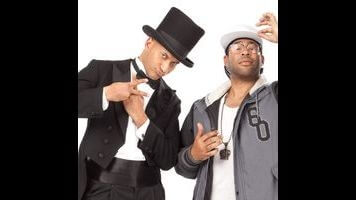It’s amazing how hard it is to do a normal ol’ sketch-comedy show on television nowadays. Comedy Central has made it a habit to pick people with some comedic range, then reverse-engineer their humor into a format that theoretically plays to their strengths (Important Things With Demetri Martin, Nick Swardson’s Pretend Time, Jon Benjamin Has A Van). Meanwhile, over at Saturday Night Live, the concern is placed on building characters, reacting to news stories, and bumping up the profile of the show’s hosts; if an idea is simply funny by its own merits, it’s bumped to late in the night. Or, presumably, cut. Key & Peele is not only refreshing because it features the perspectives of two biracial comics—a TV rarity, especially on Comedy Central—but also for its simplicity. Keegan Michael Key and Jordan Peele, both veterans of Mad TV, start with what makes them laugh, and don’t feel the need to complicate things further.
The format for Key & Peele is very similar to Comedy Central’s other sketch-driven hit, Chappelle’s Show, sthough slightly more grounded. After a cold open highlighting the different ways African-Americans speak to each other depending on the company they’re keeping, Key and Peele interact directly with an audience for stand-up bits, where they can flesh out their perspective even further: They’re biracial and have felt trapped between the white and black worlds their entire lives—sort of the thesis of the première episode. Future sketches nuance this idea further, diving into the ways romance and friendships bring this issue to the foreground. But nothing feels too heavy-handed; the relationship sketch, for example, starts in a house and ends with Key and Peele in outer space just to prove its point. There was a big marketing push for the show that included the tagline, “If you don’t watch this show, you’re racist,” but I think that actually did the show a bit of a disservice. This isn’t a racially charged sketch show; rather it’s a sketch show that uses race as a way to tap into what Key and Peele find funny. They just so happen to be biracial, so a sketch mixing Ancestry.com and Thomas Jefferson doesn’t feel out of place.
But it’s not like they felt that they had to tackle racial issues. The pair talk at length about their fondness for cooking shows, then present a goofy and charming take on the show Chopped. Peele is pretty adept at playing Lil Wayne, so the episode puts him into three sketches that are less about the rapper’s pop-cultural significance and more an excuse to stab a guy in increasingly hilarious ways. One of their sketches that already went viral features President Obama employing the help of an “anger translator” to speak directly to the American people in a way Obama could never get away with. Peele remains calm and pitch-perfect as Obama; Key gallivants around the stage with gleeful rage, to the point where it doesn’t even matter what the sketch is “saying”—only how it’s saying it.
Key and Peele are a rare duo, in that it’s almost impossible to tell who is bringing what to the partnership. If you look at Mel Brooks and Carl Reiner, for example, you see that Reiner was one of the best “straight” guys to ever live, and Brooks can turn pretty much anything into comedy. In those terms, both Key and Peele play both the straight and funny roles, depending on what the sketch calls for. The opening credits portray the pair in a bunch of different situations, displayed at a rapid-fire pace, and that adaptability continues throughout the show.
There are some differences, though. Key is taller and a bit more inwardly focused; he’s able to bring out the crazy eyes if need be, and his physicality lies in his limbs. Peele is relatively more subdued, grounding himself in a mannerism or a vocal tic at the beginning of a scene, and letting it seep into every line of dialogue. In one sketch, he goes to a clinic to get a prescription for medicinal marijuana (and Matt L. Jones, a.k.a. Breaking Bad’s Badger, is the one who takes him there), but doesn’t quite understand that he need only make up a minor ailment to get the doctor to sign off. So when Key enters as the doctor, Peele, with a broad grin, says, “AIDS”—and his naïveté doesn’t dissipate as the flustered Key tries to explain what the real deal is.
Both of the actors trained at Second City in Chicago, and you really get the sense watching Key & Peele that they think about each episode like a piece of theater. There are slower sketches and there are faster ones to mix up the pace. There are denser sketches followed by absolutely over-the-top ridiculous ones that tell one joke in as many silly ways as possible. The comedy comes from a defined perspective, but it’s one that’s open enough to include racial material alongside guilty-pleasure reality TV stuff, or a monologue from Key about the time he inadvertently insulted the hell out of one of his best friends over the phone. It’s comedy that doesn’t feel the need to make a big deal out of itself, and it’s all the funnier for its humility.









































